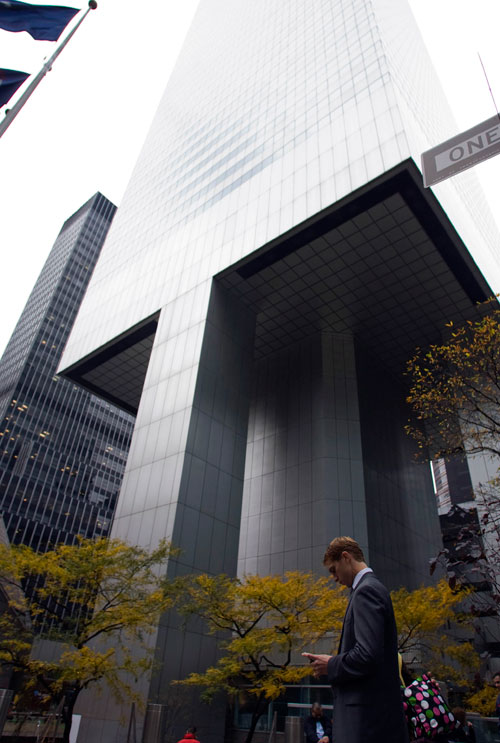David Stockman is currently at work on a new book, tentatively titled “The Triumph of Crony Capitalism,” to be published in January 2013. Regarding the crucial events of September 2008, David Stockman writes:

A man stands near Citigroup center building while working on his BlackBerry device on Friday, Nov .14, 2008 in New York. Citigroup Inc. is cutting at least 10,000 jobs in its investment bank and other areas globally. (AP/Jin Lee)
The exclusive diagnostic tool used by the principals during this entire episode was carried in their pockets. This was the Blackberry Panic of 2008. As the “eye-witness” accounts contained in the numerous histories written by financial journalists make clear, the driving force behind every action and each decision was the instantaneous oscillation of stock prices and credit spreads, and the openings and closings of financial markets around the globe. Needless to say, the dancing digits on the hundreds of blackberries toted about on the field of battle measured nothing of relevance to the public interest—even as they kept instant score on the price of the stocks and bonds of the financial institutions in play.
The journalistic histories also make clear the method of persuasion used by Washington officialdom to deliver the keys to the nation’s exchequer to Wall Street and its agents in the Treasury and the Fed. In a word, it was fear—-lurid premonitions of cash machines gone dark, payrolls undelivered, air freight grounded and assembly lines stopped-out. In the cold light of day, however, it is abundantly clear that none of these catastrophes would have occurred had TARP never been enacted. As previously shown, trillions of bank deposits were already well protected by FDICs existing powers to guarantee deposits and take over insolvent banks— along with the Fed’s capacity to make virtually unlimited discount window loans to member institutions on the presentation of standard collateral.
This fear-based stampede to adopt TARP was made all the easier by the White House’s virtual abdication from the policy process. Indeed, the contrast between these September 2008 acts of perfidy by the Bush Administration and the comparable betrayal of conservative principles by a Republican White House in August 1971 is striking. Back then, Richard Nixon called his government to Camp David and personally led the charge for policies— wage and price controls, import protection and closure of the gold window—which were antithetical to GOP principles. In September 2008, however, George Bush simply delegated his raid on the American taxpayers to the Treasury Department and then reverted to his habitual somnolence on matters of economics.
And not surprisingly. During his brief interval of success in scalping a handsome profit from the Texas Rangers franchise, George W. Bush had apparently learned little about business and virtually nothing about the nation’s now massively debt-ridden economy. So as President in the white heat of crisis he was easy prey for the fear-mongering of the cabal lead by Treasury Secretary Paulson and Chairman Bernanke. Thus, at a meeting of the Congressional chieftains the President tersely conveyed the entirety of his comprehension of the momentous matter at hand.“This sucker is going down” he told them, and in a comparative flash the nation’s petrified legislators wrote out a $700 billion blank check.
And so the TARP bailout was enshrined as a last resort exercise in breaking the rules to save the system. Ever the master of malapropism, President Bush soon took to proclaiming, “I’ve abandoned free market principles to save the free market system.”

